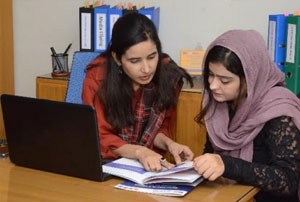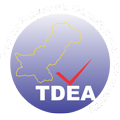Sharmeen, a university student doing her Bachelor of Science (BSc) in Education, lives with her parents and siblings in Okara, a remote district of Punjab. Being a student, she frequently browses the internet for academic pursuits and to connect with her friends and mentors through social media platforms. Although, she was cognizant of the risks associated with internet usage, she did not know, before the training, how to minimize it.
She recalls that she had no answer when people questioned her on why she had uploaded her photographs on social media and what she would do if they were misused.

Sharmeen is one of the 1,104 young women in Okara, who were trained on digital security through a project supported by USAID Ambassador’s Fund Grant Program (AFGP). Knowing how to protect her online accounts and identity along with being aware of institutions like the Federal Investigation Agency (FIA) that provides protection against digital harassment, she gained the confidence to use the internet freely. The project also set up a helpline to guide and support girls and women who faced digital harassment.
“Now, I know all the answers,” says Sharmeen with a satisfied smile. “My digital world is safe.” The training empowered her in everyday life as well. She now confidently tells people to stop when they try to harass her or other girls. She also prevents people from taking her photographs or recording videos without permission. The ripples of freedom do not end here.
The women who underwent training, started helping other girls in making their internet usage secure. But Sharmeen’s case was exemplary. Girls who wanted to report cases of online harassment sought her guidance. Seeing her dedication to the cause, the organization that trained her, took her on board as a volunteer.
“I handle the cybersecurity helpline and answer the queries of girls over phone. Some of them visit us too.”

The helpline received 332 phone calls in just over a period of nine months. Almost 20 percent of the callers sought details of legal avenues to report online harassment. Sharmeen has referred 62 girls to a 15-member “Anti- Cyber Harassment Sub-Committee,” notified by Okara Bar Council. This committee provides legal guidance to women on a pro-bono basis. They have referred three such cases to FIA and filed one lawsuit against a digital harasser.
“It is a huge success in this society where such matters are brushed under the carpet for the fear of losing ‘honor’ and the victims end up suffering in silence,” said Advocate Adeel Ahmad, a member of the sub-committee.




















